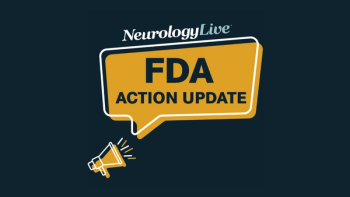Lecanemab, previously known as BAN2401, reduced the decline in Clinical Dementia Rating-Sum of Boxes (CDR-SB) by 27% compared with placebo from baseline to month 18 for participants with early Alzheimer disease (AD; P = .00005), according to positive topline results from the phase 3 Clarity AD trial (NCT03887455) announced by Eisai and Biogen, the developers of the humanized monoclonal antibody that eliminates toxic amyloid-ß (Aβ) protofibrils.1
Ultimately, the reduction represented a treatment difference in the CDR-SB score change of –0.45 between the groups. Notably, the companies announced that the FDA agreed that the results of Clarity AD may serve as confirmatory data to verify the clinical benefit of lecanemab. As such, the companies are seeking traditional FDA approval as soon as possible, submitting the application via the accelerated approval pathway to allow for review with the exception of the data from the confirmatory Clarity AD study.2
More data are expected to be announced at the Clinical Trials in Alzheimer’s Disease (CTAD) meeting in late November, including those on safety and representation. "If those data are consistent with what we saw today regarding efficacy and safety, we strongly support FDA approval and full coverage," the Alzheimer’s Association announced in a statement, additionally stating that, "These are the most encouraging results in clinical trials treating the underlying causes of Alzheimer’s to date."2
The companies officially submitted a biologics license application (BLA) in May 2022, at which time the FDA granted priority review. The application was attached to a Prescription Drug User Fee Act (PDUFA) action date of January 6, 2023.3 The BLA was supported by data from the phase 2b proof-of-concept clinical trial, known as Study 201 (NCT01767311). It was announced at the submission that the agency would consider and review results from Clarity AD.
Haruo Naito, CEO, Eisai, said in a statement that these results were “an important milestone for Eisai in fulfilling our mission to meet the expectations of the Alzheimer's disease community,” adding that the “Clarity AD study results prove the amyloid hypothesis.” Biogen’s CEO, Michel Vounatsos, echoed those sentiments in a statement, saying that, “the study shows that removal of aggregated amyloid-ß in the brain is associated with a slowing of disease in patients at the early stage of the disease.”1
As for safety, particularly related to the incidence of amyloid-related imaging abnormalities-edema/effusion (ARIA-E), the findings revealed that the profile was within expectations. ARIA-E occured in 12.5% of the lecanemab group and 1.7% in the placebo group. Symptomatic ARIA-E occurred at a rate of 2.8% in the lecanemab group and 0.0% in the placebo group. The rate of ARIA cerebral microhemorrhages, cerebral macrohemorrhages, and superficial siderosis (ARIA-H) was 17.0% for lecanemab compared with 8.7% for placebo, while symptomatic ARIA-H occurred at a rate of 0.7% in the lecanemab group and 0.2% in the placebo group.
NeuroVoices: Lynn Bekris, PhD, on Future Research for sTREM2, GFAP, and Immunotherapies in Alzheimer Disease
The molecular biologist at the Cleveland Clinic Lerner Research Institute discussed the unanswered questions regarding biomarkers sTREM2 and GFAP, and the role they play in Alzheimer disease pathology.
According to Eisai and Biogen, there was no imbalance in isolated ARIA-H between the lecanemab (8.8%) and placebo (7.6%) groups. Overall, the total incidence of ARIA-E and/or ARIA-H was 21.3% in the lecanemab group and 9.3% in the placebo group.1
Clarity AD included 1795 people with early AD randomly assigned 1:1 to treatment—10 mg/kg bi-weekly of lecanemab—or placebo. Of note, an estimated 25% of the total enrollment in the US included Hispanic and African American individuals with early AD, and the overall cohort was deemed generally comparable to the Medicare population.
In April 2022, data published using the AD Archimedes condition-event (ACE) disease stimulation model, the investigational agent was estimated to slow the rate of disease progression, resulting in an extended duration of mild cognitive impairment because of AD and mild AD dementia and shortened duration in moderate and severe AD dementia. Compared with standard of care alone, the proportion of patients treated with lecanemab plus standard of care who progressed to mild AD, moderate AD, and severe AD were reduced by 7%, 13%, and 10%, respectively. The model also predicted a 25% lifetime probability of needing institutional care for those who received the combination of treatments compared with 31% for standard care.4
These data mark a moment of momentum for AD drug development following the tumultuous journey of aducanumab (Aduhelm; Biogen) in 2021. The Alzheimer's Association similarly noted that if the final results are in line with those announced today and the agent is approved, "Medicare beneficiaries living with Alzheimer’s, a terminal, progressive disease, deserve the same immediate, full coverage under Medicare afforded to those with other terminal diseases."
Additionally, these results are the first of the data readouts expected in what remains of 2022, with Roche planning announcements of a pair of 2-year studies on its investigational antibody gantenerumab. In March 2022, Roche announced that it would be conducting a new phase 3 clinical trial, called SKYLINE (NCT05256134), which will evaluate the subcutaneous antiamyloid antibody as a preventive treatment for patients with early signs of AD.5 Gantenerumab was awarded a breakthrough therapy designation by the FDA in October 2021, after findings from the ongoing SCarlet RoAD (NCT01224106) and Marguerite RoAD (NCT02051608) open-label extension trials, which showed that the therapy significantly reduced brain amyloid plaques.6
Then, in the first half of 2023, Eli Lilly anticipated its results from the pivotal phase 3 TRAILBLAZER-ALZ 2 study (NCT04437511) trial on donanemab, which targets a modified form of amyloid-ß called N3pG. The double-blind, randomized controlled trial is meant to replicate the findings of the TRAILBLAZER-ALZ study (NCT03367403), in which donanemab was shown to slow Alzheimer disease (AD) progression by 32% as measured by Integrated Alzheimer’s Disease Rating Scale (iADRS) scores.7
REFERENCES
1. Lecanemab confirmatory phase 3 clarity ad study met primary endpoint, showing highly statistically significant reduction of clinical decline in large global clinical study of 1,795 participants with early Alzheimer’s disease. News release. Eisai, Biogen. September 27, 2022. Accessed September 27, 2022. https://www.prnewswire.com/news-releases/lecanemab-confirmatory-phase-3-clarity-ad-study-met-primary-endpoint-showing-highly-statistically-significant-reduction-of-clinical-decline-in-large-global-clinical-study-of-1-795-participants-with-early-alzheimers-disease-301634888.html
2. Alzheimer’s Association Statement on Lecanemab Phase 3 Topline Data Release. News release. Alzheimer’s Association. September 27, 2022. Accessed September 27, 2022. https://www.alz.org/news/2022/alzheimers-association-statement-on-lecanemab-phas
3. The FDA accepts BLA and grants priority review for lecanemab for treatment of early Alzheimer disease under the accelerated approval pathway. News release. Biogen / Eisai. July 6, 2022. Accessed September 27, 2022. https://www.biospace.com/article/releases/the-fda-accepts-bla-and-grants-priority-review-for-lecanemab-for-treatment-of-early-alzheimer-s-disease-under-the-accelerated-approval-pathway/
4. Monfared AT, Tafazzoli A, Ye W, Chavan A, Zhang Q. Long-term health outcomes of lecanemab in patients with early Alzheimer’s disease using simulation modeling. Neurol Ther. 2022;11:863-880. doi:10.1007/s40120-022-00350-y
5. Roche and three leading research institutions combine expertise on new Alzheimer’s prevention trial. News release. Roche. March 3, 2022. Accessed September 27, 2022. https://www.roche.com/investors/updates/inv-update-2022-03-03
6. Ad hoc announcement pursuant to Art. 53 LR: Genentech’s anti-amyloid beta antibody gantenerumab granted FDA breakthrough therapy designation in Alzheimer disease. News release. Genentech. October 8, 2021. Accessed September 27, 2022. https://www.businesswire.com/news/home/20211008005371/en/Ad-hoc-announcement-pursuant-to-Art.-53-LR-Genentech%E2%80%99s-Anti-Amyloid-Beta-Antibody-Gantenerumab-Granted-FDA-Breakthrough-Therapy-Designation-in-Alzheimer%E2%80%99s-Disease
7. Lilly’s donanemab slows clinical decline of Alzheimer’s disease in positive phase 2 trial. News release. Eli Lilly. January 11, 2021. Accessed September 27, 2022. https://www.prnewswire.com/news-releases/lillys-donanemab-slows-clinical-decline-of-alzheimers-disease-in-positive-phase-2-trial-301204830.html











